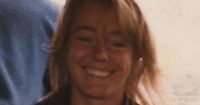A bombshell document that could have led to the conviction of Julie Ward's suspected murderer was left locked inside a safe at a London police station for nine years, raising serious questions about the investigation into her tragic death in Kenya in 1988. Julie, a 28-year-old British woman from Bury St Edmunds, Suffolk, was on a wildlife photography trip when she disappeared, sparking a massive search led by her father, John Ward, who devoted the rest of his life to seeking justice for his daughter.
The new evidence, a handwritten witness statement, places Jonathan Moi, the son of then-Kenyan President Daniel Arap Moi, at the scene of the crime, contradicting his long-standing denial of being in the Masai Mara game reserve at the time. This revelation has prompted Julie's family to allege a cover-up involving Scotland Yard, the Foreign Office, and Kenyan authorities to protect diplomatic relations.
Bob Ward, Julie's brother, has taken up the mantle of his father's relentless pursuit of justice following John Ward's death in 2023. He stated, "It’s a conspiracy. There’s been a cover-up right from the start. They’ve been lying over and over and over again. It’s time we told the world what really happened." Bob believes that the British authorities have deliberately suppressed evidence to avoid diplomatic fallout with Kenya, a significant partner for the UK.
Julie was last seen on September 6, 1988, at the Sand River Campsite in the Masai Mara. Four days later, her family received the devastating news that she was missing. John Ward immediately flew to Kenya, where he hired a private plane to search for her. He discovered her abandoned jeep, and later, her remains were found 10 miles away. Despite initial indications of murder, the investigation faced numerous obstacles, including alleged tampering of evidence and a lack of cooperation from Kenyan authorities.
Bob Ward has been vocal about the frustrations of dealing with Scotland Yard, claiming that vital evidence was ignored or mishandled. He revealed that in 2011, a police officer obtained a witness statement that placed Jonathan Moi near the crime scene, but this information was not pursued, and the document remained locked away in a police safe until 2020. "Why was this vital piece of evidence left under lock and key for so long?" Bob asked, expressing his anger over the apparent negligence.
In 1997, Jonathan Moi issued a statement claiming he was at his farm in Eldama Ravine throughout September 1988, over 110 miles from where Julie died. However, the witness statement obtained in 2011 directly contradicts this claim, stating, "I remember that Jonathan Moi and his party arrived very late... I definitely know that Jonathan Moi arrived at the site that night as I greeted him and spoke with him." The witness also noted that Moi and his friends did not return to the camp the following day, which was unusual.
The situation became even more complicated when the police pathologist initially ruled that Julie had been murdered, only for the report to be altered to suggest her injuries were caused by wild animals. John Ward commissioned multiple forensic reports, which consistently indicated that Julie had been murdered, hacked up, soaked in petrol, and set on fire. Despite this overwhelming evidence, Jonathan Moi was never charged.
Bob Ward has expressed his belief that the British government and Scotland Yard were more interested in maintaining good relations with Kenya than in seeking justice for his sister. He recalled being told by British diplomats, "Don’t rock the boat," which he interpreted as a directive to avoid causing diplomatic tensions. An independent inquiry conducted by Lincolnshire Police found that there was indeed evidence of obstruction in John Ward's inquiries by officials in the previous Kenyan regime.
In 2022, the Ward family formally lodged a complaint with the Metropolitan Police, alleging corruption and collusion in the investigation. While the police acknowledged that their early investigations were completed hastily, they claimed there was no new evidence to warrant reopening the case. Bob Ward has vowed to continue the fight for justice, stating, "I want justice for Julie and justice for Dad. It’s a promise I made to Dad before he died."
The witness statement and other key pieces of evidence have been described as crucial to understanding the circumstances surrounding Julie's death. Bob believes that many people in Kenya still know the truth about what happened and hopes that one day they will come forward. He remains determined to uncover the truth, despite the challenges posed by time and the loss of key figures in the case.
In summary, the case of Julie Ward remains a tragic reminder of the complexities and challenges faced by families seeking justice in the face of alleged cover-ups and bureaucratic obstacles. With new evidence emerging, the Ward family continues to press for answers, determined to ensure that Julie's story is not forgotten.




